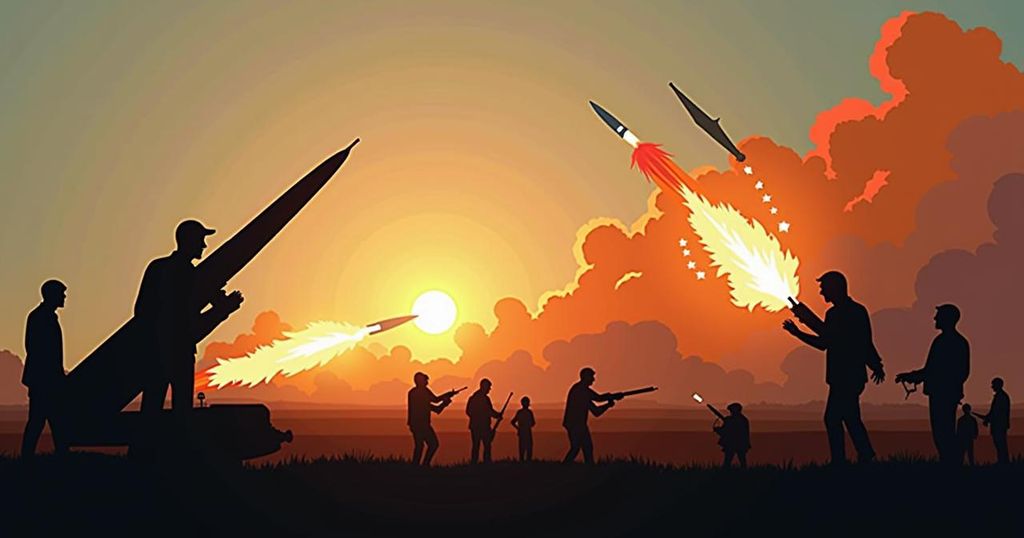In response to Iran’s recent missile attacks, Israel is poised to launch a strong retaliatory action targeting strategic Iranian assets. Prime Minister Netanyahu has indicated that Iran will face consequences for its aggression. The effectiveness of Israel’s defenses limited damage, but analysts suggest a more significant response is warranted due to the nature of the attack. The situation remains tense as U.S. support bolsters Israel’s military stance against Iran, heightening the risks of conflict escalation in the region.
Israel is poised to respond decisively to recent missile attacks from Iran, which were a retaliation for the deaths of prominent Iranian-affiliated leaders. With the potential for a regional conflict escalating, the Israeli government is weighing options to counteract Iranian strikes. Prime Minister Benjamin Netanyahu has already asserted that Iran has “made a big mistake and will pay” for its actions, a statement that underscores the seriousness with which Israel intends to approach the situation. The missile assault, involving 180 projectiles, resulted in no casualties largely due to the effectiveness of Israel’s Iron Dome defense system, which intercepted most of the missiles. Analysts suggest that Iran’s attack was a calculated move to reassert its deterrence capacity but ultimately served as a symbolic gesture rather than a significant military leap. Given the limited damage inflicted, Israel is likely to consider a measured response akin to its previous retaliations against Iranian missile strikes. However, the intensified nature of this latest assault—major components of which breached Israeli defenses—compels Israel to formulate a more robust retaliation. Potential targets include Iran’s nuclear and oil facilities, as well as the Islamic Revolutionary Guard Corps’ installations. Israeli officials, including former Prime Minister Naftali Bennett, have emphasized the need to act decisively to dismantle Iran’s nuclear capabilities while concurrently reminding the international community of the perceived justification for such actions due to Iran’s demonstrated aggression. News reports indicate that United States support for Israel remains unwavering, as President Biden confirmed the U.S. would back its ally in response to Iranian hostility. This collective stance could rationalize further military operations against Iranian positions, although such actions might provoke a more stringent Iranian reaction, as indicated by Iranian military officials who threaten increased missile attacks targeting Israeli infrastructure if provoked again. In conclusion, the Israeli government’s resolve to respond to Iranian provocations will likely result in escalated military actions targeting significant strategic assets within Iran, with implications for regional stability depending on the scale and nature of the response. The situation remains tense, with the international community closely monitoring developments as both nations navigate this precarious phase of their longstanding conflict.
The current escalation in tensions between Israel and Iran follows a series of aggressive actions and retaliations. Israel’s prior targeted strikes against key figures within the Iranian-supporting factions have led Iran to retaliate through missile attacks aiming at military installations in Israel. This complex interaction is indicative of the longstanding hostilities and mutual distrust between Israel and Iran, characterized by a history of proxy wars in the region. The geopolitical stakes are high, with U.S. involvement promising to further complicate the dynamics at play. The latest missile attack by Iran was seen as a show of strength and a response to perceived Israeli aggression, setting a dangerous precedent for future engagements.
In summary, Israel’s impending response to Iran’s missile attack is anticipated to be extensive and multifaceted, addressing strategic military and infrastructural targets within Iran. As the nation contemplates its course of action, the regional balance of power is at stake, with heightened risks of further escalation. The backing of the United States will lend significant international support to Israel’s efforts, notwithstanding potential repercussions that could arise from actions taken against Iranian assets. Negotiations and diplomatic dialogues will be pivotal in mitigating a widening conflict, emphasizing the need for restraint amidst soaring military tensions.
Original Source: www.aljazeera.com






